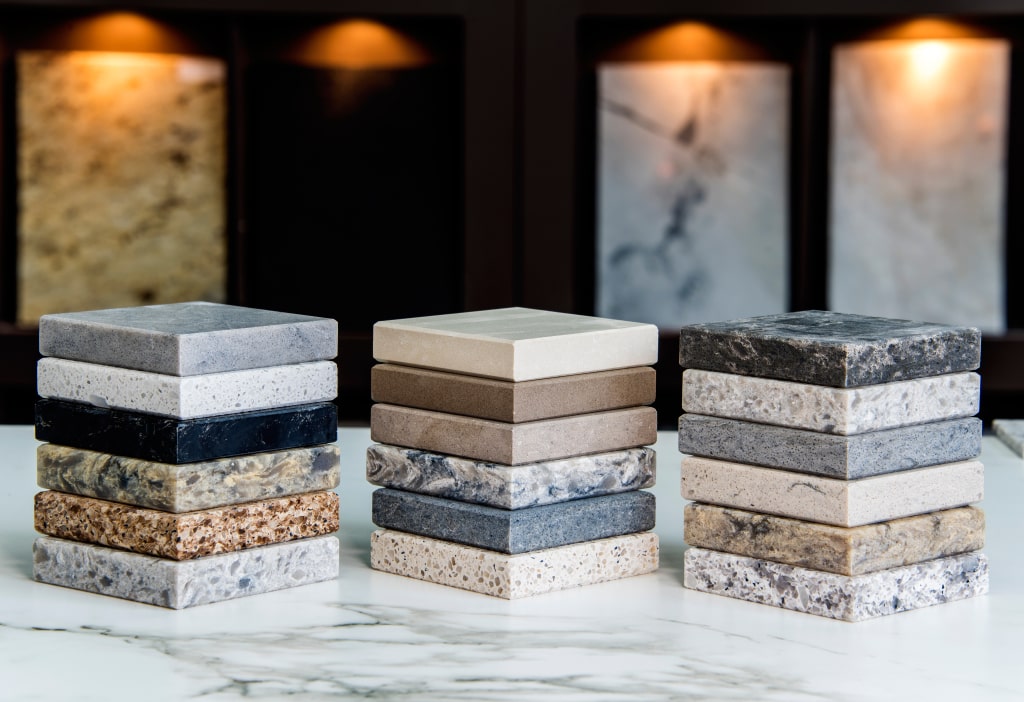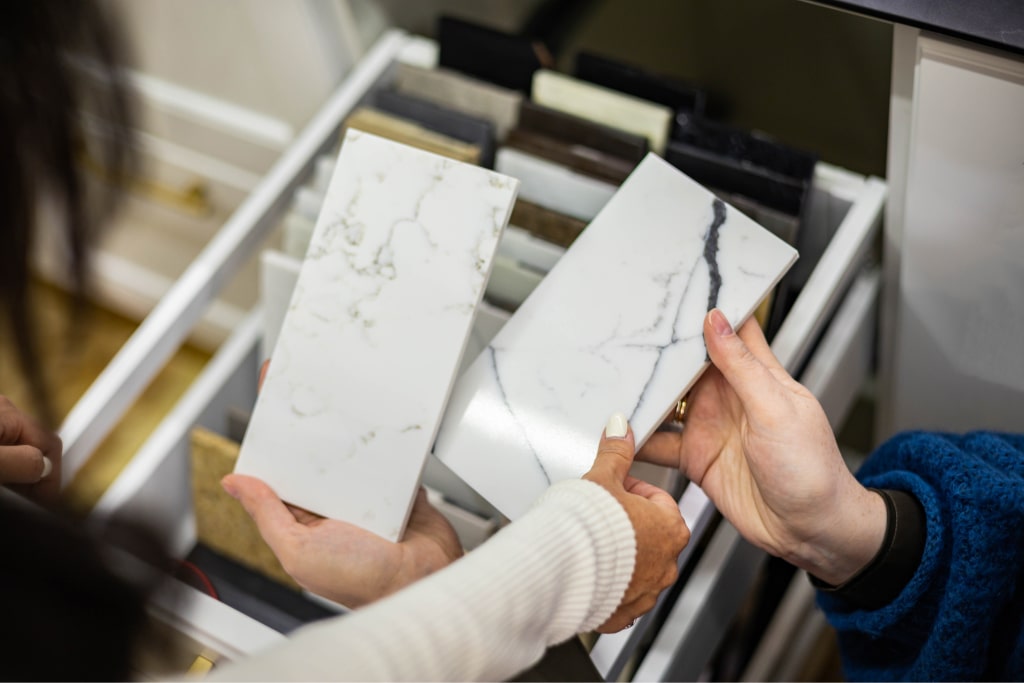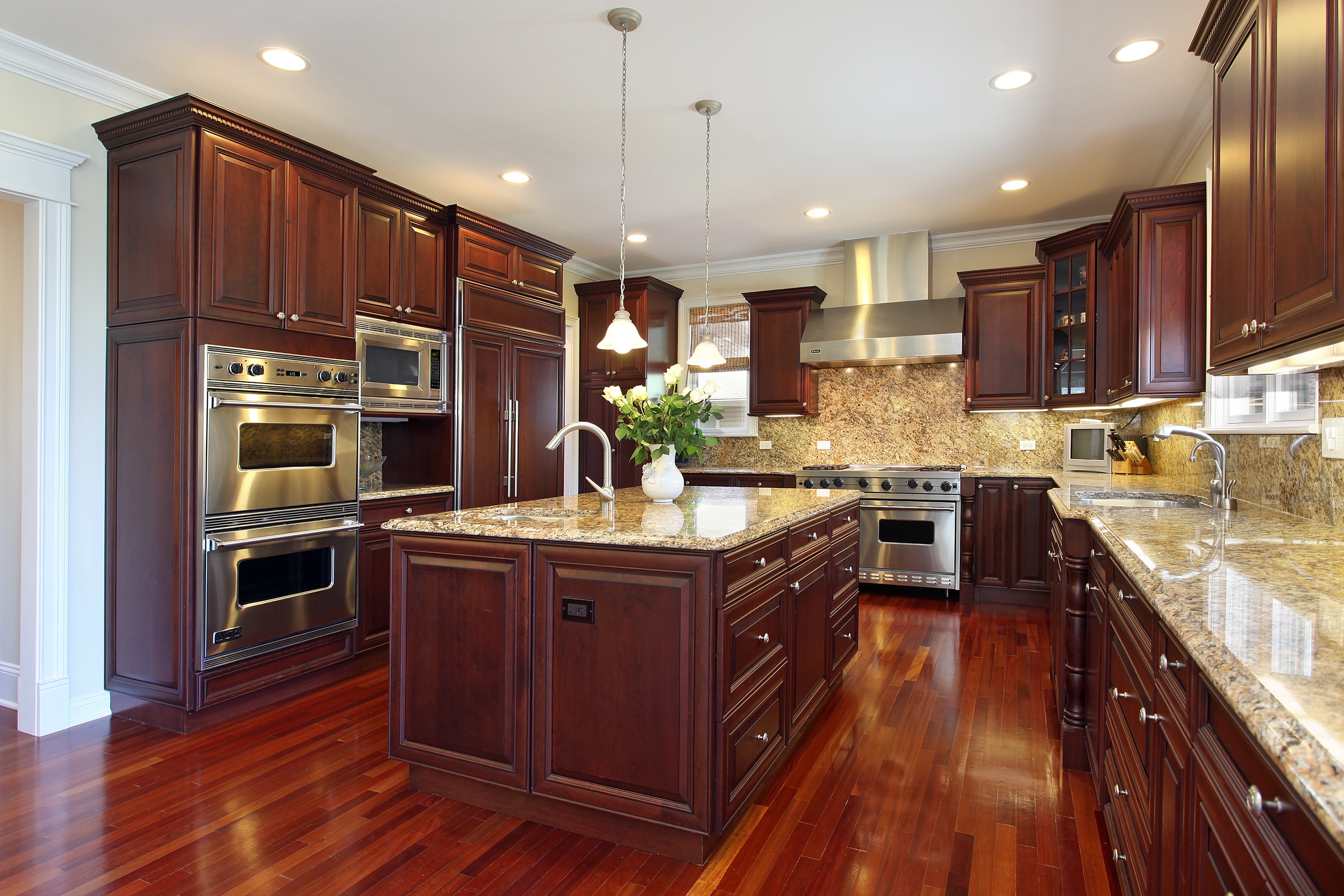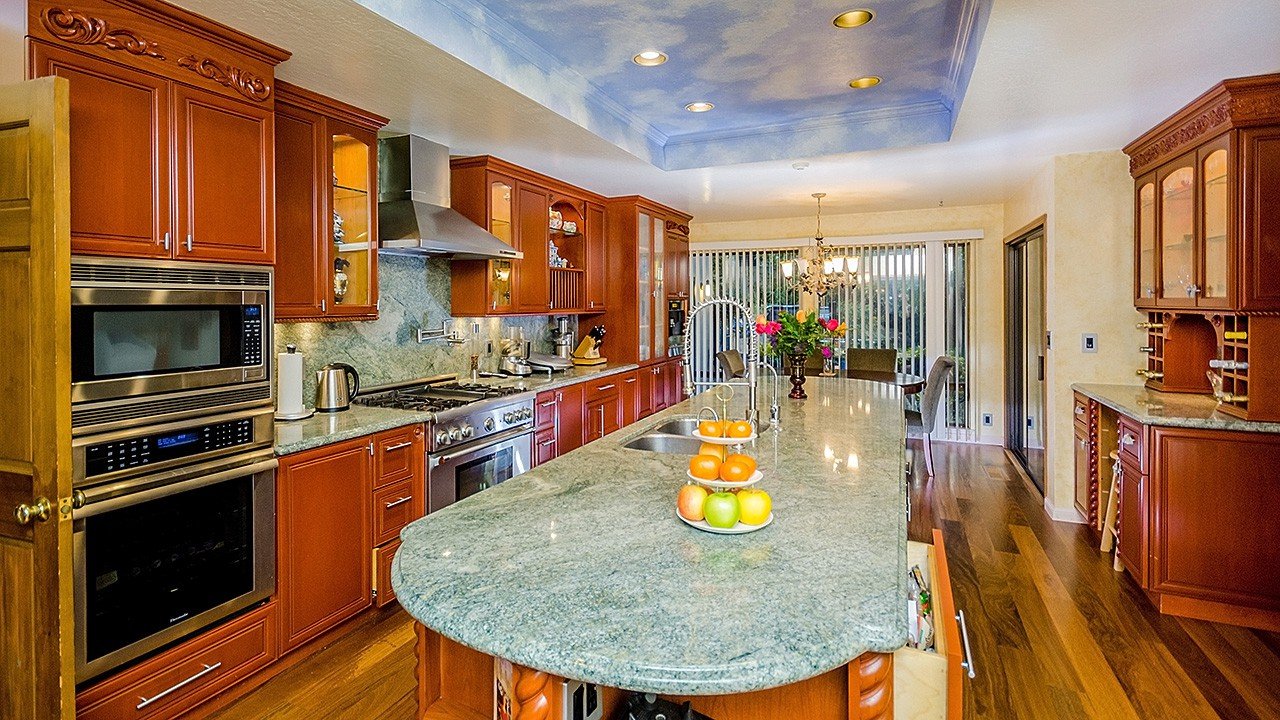Are Quartz Countertops More Expensive Than Granite?

When it comes to selecting the perfect countertop material for your home, cost is often a crucial factor in the decision-making process. Quartz and granite have long been revered as top choices due to their durability, aesthetics, and ability to add value to a property. However, the question on many homeowners’ minds is: Are quartz countertops more expensive than granite?
In this article, our team at Granite Selection will delve into the fascinating realm of countertop options and explore the cost considerations associated with quartz and granite. We’ll examine the various factors that influence the price of these materials and offer valuable insights to help you make an informed decision that aligns with your budget and aesthetic vision.
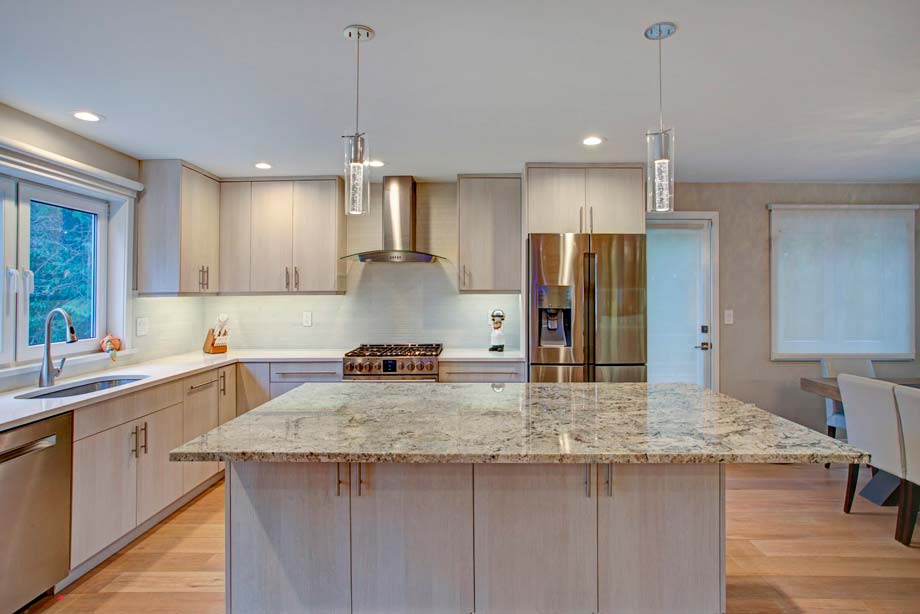
Quartz vs. Granite: What Is What?
Besides the granite vs. quartz price debate, there are other factors like durability, functionality, and lifestyle factors to consider when deciding which countertop to invest in. Both have their advantages and disadvantages. So, is quartz cheaper than granite? Let’s look at both granite and quartz’s unique characteristics and their often unconsidered costs.
What Is Granite Stone?
Granite is a natural stone that’s widely used as a countertop material in many homes. It’s formed through the cooling and solidification of molten magma deep within the Earth’s crust, resulting in a durable and unique material. Granite countertops are timeless and elegant, with a wide range of colors and patterns to choose from.
The natural variations in the stone give each countertop a distinctive appearance, making it a popular choice for homeowners seeking a one-of-a-kind aesthetic. Granite is known for its strength and durability, as it’s highly resistant to scratches, heat, and stains as long as it’s properly sealed and maintained.
Even though it may require occasional resealing, granite can last for decades, making these countertops a long-term investment for homeowners.
What Is Quartz Stone?
Quartz countertops are engineered stone surfaces made from natural quartz crystals, combined with resins and pigments to create a durable and versatile material. Unlike granite, which is mined as a slab and then cut to fit, quartz countertops are manufactured using a mix of quartz particles and binding agents.
This manufacturing process allows for a wider range of quartz colors and patterns to be created. This means that homeowners have more design options to match their preferences and existing decor. Quartz countertops are highly resistant to scratches, stains, and heat, so they’re a practical choice for busy kitchens.
While quartz kitchen countertops can be slightly more expensive than granite, their low maintenance and long-lasting properties can help homeowners save money in the long run.
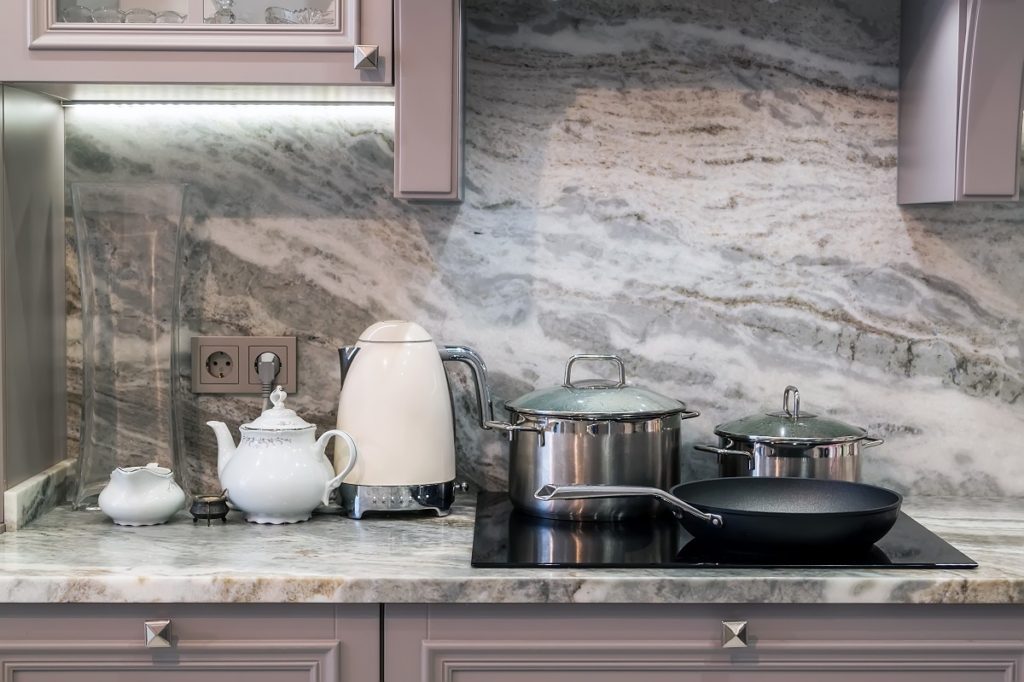
Quartz vs. Granite Costs
Is quartz less expensive than granite? Yes and no. Most opt for quartz for kitchen and bathroom countertops because they think it’s cheaper. But if you’re buying the most expensive quartz, it can be just as expensive as some granite slabs. Determining what is the cost of quartz vs. granite depends on each project’s specifications.
How Much Does a Slab of Granite Cost?
Choosing the right countertop material is an essential decision for homeowners. Not only do they contribute to the aesthetics of a kitchen or bathroom, but they also play a significant role in functionality and durability. We know that when it comes to popular options like granite and quartz, the cost is often a factor that homeowners consider. In this table, we’ll explore the average cost range for granite slabs, providing an overview of the expenses involved in selecting granite countertops.
| Granite Grade | Price Range per Square Foot |
|---|---|
| Entry Level | $40 – $60 |
| Mid-Range | $60 – $80 |
| High-End | $80 – $150+ |
The cost of a granite slab for countertops can vary depending on factors such as quality, color, pattern, thickness, and location. As indicated in the table, the price range per square foot can be roughly between $40 and $150+.
However, remember that the overall cost of granite countertops includes fabrication, installation, edge profiles, and any customization or extras required.
On average, homeowners can expect to spend between $2,000 to $4,500, including installation, for granite countertops. We recommend that you consult with local suppliers and fabricators to obtain accurate pricing information tailored to your specific project.
Granite vs. Quartz Cost Comparison Table
Many are surprised to learn that over the past decade, the cost of quartz has dropped significantly, and it’s now much more affordable. While some businesses have failed to update their prices, there’s no reason to presume a quartz countertop is out of budget.
| Quality/Brand | Average Price per Square Foot |
|---|---|
| Low-End | $50 – $70 |
| Mid-Range | $70 – $90 |
| High-End | $90 – $150+ |

To help you solve your quartz vs granite dilemma, we have a big collection of projects to show you.
Quartz vs.Granite Cost Factors
Color, thickness, source, and shipping, as well as the installation, will influence the average cost of granite vs. quartz. So, is quartz cheaper than granite? Well, granite is a natural stone, and some varieties are rarer than others, whereas engineered quartz can be manufactured to look like their natural counterparts, which at times can make it slightly cheaper.
1. Color
When comparing the cost of quartz and granite countertops, color plays a significant role. Quartz countertops offer a wider range of color options compared to granite. Quartz is an engineered stone, allowing manufacturers to create an extensive palette of colors and patterns. Whether you prefer subtle neutrals, vibrant hues, or natural-looking patterns resembling marble or granite, you’ll likely find a quartz countertop that suits your taste.
On the other hand, granite is limited to the colors and patterns found in nature. While granite offers a beautiful and unique appearance, the variety is narrower compared to quartz. Granite countertops cost more in some scenarios due to the scarcity and availability of certain granite colors.
To provide some cost examples, let’s consider the average prices for quartz and granite countertops based on color. Keep in mind that these prices can vary depending on the supplier, location, and specific color or pattern chosen:
- Quartz Countertops (average cost per square foot):
- Basic colors: $50 – $70
- Popular colors: $70 – $90
- Specialty or high-end colors: $90 – $150+
- Granite Countertops (average cost per square foot):
- Common colors: $40 – $60
- Exotic or rare colors: $60 – $100
- Premium or luxury colors: $100 – $200+
2. Thickness
The thickness of granite and quartz countertops can also impact their cost. Both quartz and granite countertops come in various thicknesses, typically ranging from 1.25 inches to 2 inches. Thicker countertops are generally more expensive due to the additional material required and the extra labor involved in fabrication and installation.
Here are some real cost examples for different thicknesses of quartz and granite countertops, based on the average cost per square foot:
- Quartz Countertops:
- 1.25 inches thick: $50 – $80
- 2 inches thick: $70 – $120
- Granite Countertops:
- 1.25 inches thick: $40 – $70
- 2 inches thick: $60 – $100
3. Source and Shipping
When it comes to comparing the costs of shipping quartz and granite countertops, there are a few factors to consider. The source of the materials and the distance they need to travel play significant roles in determining the final shipping expenses. While it’s challenging to provide specific and accurate numbers without knowing the exact locations and quantities, let’s discuss average costs to give you a general idea.
For quartz countertops, the shipping costs vary depending on where the quartz is sourced from and its final destination. Quartz is manufactured by combining natural quartz crystals with resins and pigments, resulting in a more consistent and uniform appearance compared to granite. Since quartz is typically produced in factories, it’s sometimes easier to ship in larger quantities and standardized sizes. On average, shipping quartz countertops domestically within the United States can range from $100 to $500, depending on the distance and quantity.
Granite countertops, on the other hand, are natural stone products sourced from quarries around the world. Due to the weight and bulkiness of granite slabs, shipping costs can be higher compared to quartz. The shipping expenses for granite countertops are influenced by factors such as the distance traveled, the location of the quarry, and the availability of transportation networks. On average, shipping granite countertops within the United States can range from $200 to $800 or more, depending on the distance and quantity.
4. Installation
The cost of installation for kitchen and bath countertops is another factor to consider when comparing the expenses of quartz and granite. The installation process typically involves several steps, including measuring, cutting, and fitting the slabs, as well as sealing and securing them to the cabinets or supporting structure.
The installation costs can vary depending on factors such as the complexity of the project, the size of the countertop area, and the region’s labor rates. Here are some real cost examples for installation based on the average cost per square foot:
- Quartz Countertop Installation: $40 – $80
- Granite Countertop Installation: $50 – $100
These figures are approximate and can vary based on the factors we mentioned above. Sometimes, installation costs for granite and quartz may be bundled with the overall material cost, while others may be charged separately. Make sure to clarify the details with your countertop supplier or installer to get an accurate estimate for your specific project.

AMAZING-LOOKING KITCHEN IS WHAT YOU NEED!
We have over 14,000 quartz and granite slabs in stock! Take a look, and we’ll be happy to help you make your choice.
What Should You Consider to Make the Final Quartz vs. Granite Cost Decision?
In contrast, quartz offers far greater variety in terms of look and feel because it’s an engineered stone made from 90% quartz stone particles bound together by a cement-based polymer. Quartz can mimic the look of granite, marble, or concrete. It’s made to order and can be customized to match odd curves, quartz countertop edges, and other unique project needs.
1. Appearance
- Quartz: This engineered stone is available in colors ranging from the pearliest of whites to the truest of blacks. Quartz has a deep, three-dimensional appearance, much like natural stone. Because it’s manufactured, it contains consistent patterns. These countertops have some unique veining patterns that can’t be found in natural stone.
- Granite: This stone comes in variations of white, black, gray, beige, and brown. Each granite slab is one-of-a-kind and contains some naturally occurring imperfections. Granite contains flecks and veins of a rich and colorful variety; some even look like marble. Patterns vary from veins to mottled specks and larger splotches.
2. Durability
- Quartz: The fact that these countertops are made with quartz particles and polymer resins makes them more durable and reduces porosity. However, they’re not as heat-resistant as granite. Quartz doesn’t contain any striations, so the risk of cracking or chipping is low.
- Granite: Granite is incredibly durable but comes in second place to quartz when it comes to daily wear and tear. As a natural stone, it needs to be sealed with resin-based binders to increase resistance to standard damages. While unlikely to happen if handled with care, granite countertops are prone to cracks and chips.
3. Maintenance
- Quartz: Quartz countertops cost considerably less to maintain than granite. Quartz is less porous and less prone to staining and chipping. It comes pre-sealed and can be easily maintained by wiping down and cleaning with gentle soap products.
- Granite: This stone is more porous and requires additional maintenance. When stains seep in, they can be challenging to get out, so constant cleaning is a must. Granite countertops need to be resealed every so often, ultimately making them more expensive because their maintenance costs could accumulate to prevent damage and unsightly surface marks.
4. Eco-Friendliness
- Quartz: When compared to other countertops, quartz lasts longer and is even recyclable. While mining activities remain in gray areas, quartz is extracted in the safest way possible. Many of its natural stone elements are reclaimed by-products from the quarrying process itself, which would have otherwise gone to waste. No stone is quarried solely for use in quartz countertops, making it an ideal choice for homeowners who want an eco-friendly kitchen remodel.
- Granite: While the quarrying process of granite does impact the environment, its carbon footprint is comparable to cutting wood from sustainable sources. It’s a long-lasting stone that’s relatively eco-friendly, hygienic, and can be down-cycled for other applications.
5. Real Estate Value
Both quartz and granite countertop materials add value to your home. Not only do both of these add a polished look to your kitchen and bathrooms, but they’re also durable and long-lasting high-quality materials.
Of course, you’re wondering which option offers a greater advantage on the market. Granite is considered to be slightly more valuable than quartz slabs, largely because it’s a naturally occurring stone rather than man-made. However, both offer a good return on investment in the long run.
Opt for Granite Selection to Experience Top-Quality Granite and Quartz Countertops!
Tallying up quartz vs. granite costs depends on your project and budget. As you can see, there are many variables at play when determining the average cost of granite vs. quartz. Regardless, no matter which stone you choose, we always recommend hiring professional fabricators to ensure your countertops are beautifully installed.
Our experts at Granite Selection can help you make the best decision based on your lifestyle and budgetary needs. If you’re ready for a remodel, consider our special offers on discounted quartz countertops and granite countertops for sale in Chicago. If you want detailed information on the quartz vs. granite price quandary that many of our clients face, then contact us today or give us a call at (888) 906 3317. We’re more than happy to help with all your questions about granite and quartz countertops.

